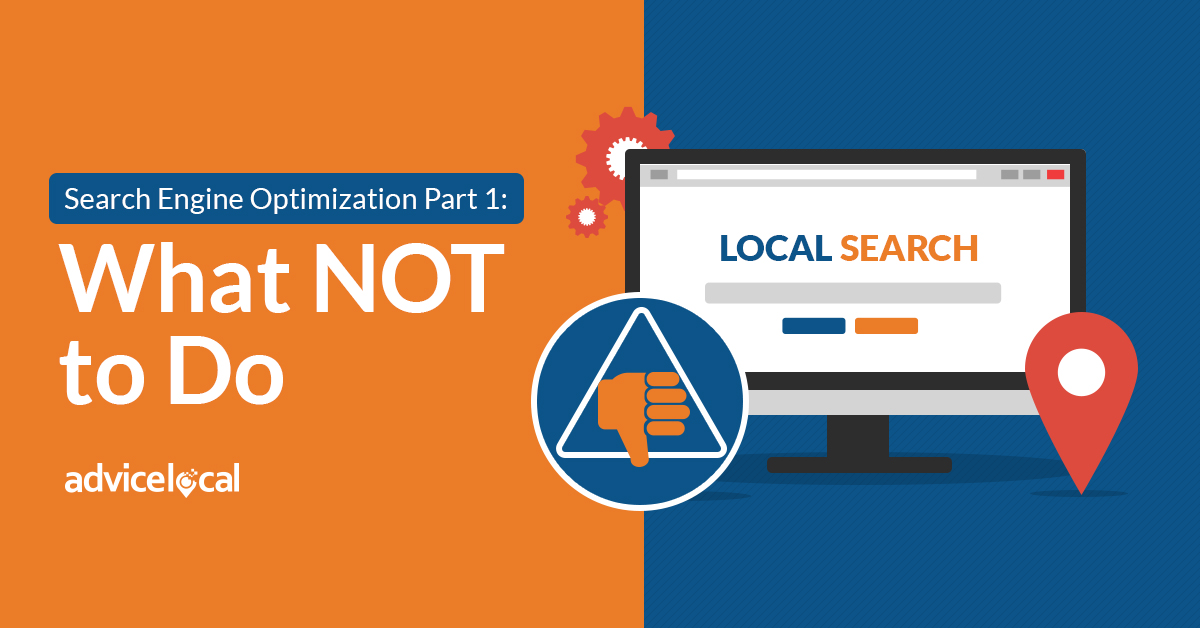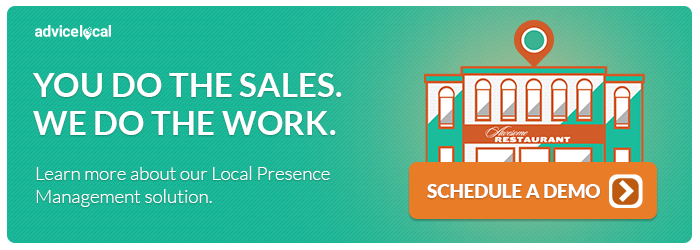All right people, no one should have to prove the value of adding search engine optimization (SEO) and local SEO to your digital marketing efforts. But for those who need a few numbers to be convinced or those new to the space, here are some local SEO stats, which are heavily driven by consumer mobile habits these days:
- 50 percent of consumers who search from a mobile device, visit a store within one day of the search and more than 50 percent of local searches, conducted from a mobile device, lead to sales
- Local searches via search engines happen at a rate of 88 percent on smartphones and 84 percent on computers and tablets
- 73 percent of smartphone users prefer to use mobile web to make purchases instead of using a mobile app
As you can see, the potential for profit is great if you’ll take the time to implement a good strategy, which really should factor in mobile and local. The SEO process can appear daunting with all its rules, techniques and the various types (traditional, local, technical) each affecting results differently. This is where making sure you have a firm foundation comes into play.
If you want to see the percentages of consumers from above find the local businesses you represent and convert them from curious to paying customers, it pays to review some SEO basics. So this week and next, I’ll be reviewing SEO 101.
Today, the power of search engines and websites which do well in results pages (SERPs) is largely in the hands of consumers. While once primarily link- and keyword-driven, in terms of placement factors, search engines are now better than ever at determining what kind of user experience your website delivers. They’re also getting better at understanding consumer intent in search. As such, the line between impressing the search engines and your visitors is getting ever smaller.
This week we’ll discuss what SEO is and what you should watch out for and stay away from to be successful. The last thing you want is to put in a tremendous amount of work, build a great plan, then implement it only to be penalized because you didn’t consider something basic. Think of all the pandemonium that followed the release of Google Panda. (Yes, I went there) So grab your note taking implements and join me in the classroom for SEO 101.
SEO: What You Need to Know
So you’re one little fish who has to keep swimming in the giant sea of websites; how in the world do you get Google, Bing and Yahoo to even notice you? While a great website delivering quality content on a regular basis will get noticed all by itself, especially now with Google’s focus on the importance of E-A-T content, it will still attract fewer visitors if SEO practices are not implemented in website and content creation. It’s about more than adapting your website based on analysis of search engine technology and the way search engine crawlers read, index and rank your content.
Search engines are smarter, with people like Gary Illyes “afraid” of how fast the AI are learning. Algorithms are constantly being improved to find and reward websites which show strong signals of providing good content and a good user experience. There are many legitimate ways to increase a website’s ranking in the search engines, but quality and relevancy are by far the most important factors which come into play. According to Google’s Webmaster Guidelines, a website should be clearly laid out in a fashion which is easy to navigate with links to relevant pages and external websites.
Content should be relevant to the keywords and phrases that it is trying to target, and all visual content should ideally be accompanied by captions and other textual content so that the search engines can better identify the subject matter concerned. The structure of your website plays an important part in SEO, as well. Not only should the website be easy to navigate by your human readers – it should also be clearly viewable by the search engine crawlers. Web designers should stick to conventional practices, making sure that their HTML code is clean and error-free.
You’ve Got to Know Where Not to Go with SEO
Black-hat SEO tactics are still prevalent, so the first step of formulating any SEO strategy should be to familiarize yourself with what not to do. If you decide to hire an SEO agency, it is particularly important that you know what to look out for when choosing a company that is suitable and reputable.
You don’t want your website penalized by search engines, as it can cause a sharp drop in traffic, leading to a drop in sales. Whatever you or your SEO agency does, make sure that it does not involve the following:
- Never buy backlinks to your website. Run away quickly if an agency promises a guaranteed number of links for either a one-time fee or a subscription. Google has stated time and again, it does not tolerate link buying schemes.
- Also, steer clear of any SEO agency which promises a guaranteed higher search placement, within a specific timeframe.
- Don’t rely on low-quality content, artificially inflated social media shares, or guest posts on irrelevant forums. Some unscrupulous SEO agencies and marketers have gone so far as to open fake social media profiles, creating large numbers of followers which don’t actually exist.
- Keyword density is a myth. For the love of all that is wonderful, stop stuffing! Targeted keywords should fit in naturally with your content and never stand out. Content creation firms, SEO agencies and freelancers should and do know better.
- You may be smarter than a fifth grader but you’re not smarter than search engine algorithms. Never attempt manipulation by showing search engines content that is different from what your readers see. Common cloaking tactics to avoid include doorway pages and hidden text containing keywords.
If perhaps you made the mistake of hiring a black-hat SEO company or used shady tactics yourself in the past, you have a lot of work to do to reverse the damage done. You’ll need to:
- Put together a list of inbound links from low quality or irrelevant sites and get them removed. If this isn’t possible, you can use the Google Disavow tool.
- You’ll need to put together a sound content and social media marketing schedule and get rid of or disassociate yourself from any poor practices you used in the past.
- In the event that one of your websites has already been penalized, you’ll have to work hard to change your image and correct your mistakes going forward before submitting a reconsideration request to Google via Webmaster Tools.
Looking Ahead
Now that you know a little about this crazy thing called SEO and have a good grasp of what not to do, we have a great foundation upon which to build best practices. Here’s part 2 of this series – Fighting the Good Fight.
To be successful in the digital space, or in any area of life it’s great to start with a definition and a knowledge of the problem you want to solve. I believe we’ve done that today and can hardly wait to get to the good stuff!
I know this can all be a little overwhelming. Advice Local has a team of digital marketing professionals that can help you! Request a demo and learn more today.
Be sure and come back each week for more local search news from the #QueenofLocalSEO.





Excellent post Bernadette! Thanks a lot for sharing it, learned a lot 🙂
I see why you are called the Queen of SEO – you really are very knowledgeable about internet marketing. The section about what to NOT DO was most helpfult to me. That was new information to me like buying links are not allowed..thanks for taking the time to write this helpful article.
As you requested, here is the answer to this question you posed “What were your biggest challenges with SEO in the beginning?”
For me it was understanding all the different type of sites – web 2.0, citations, directories, image sharing, document sharing etc. It took time and some study but I understand the difference now and when each type is needed for a clients search engine marketing program. Thanks for all this good info.
Bernadette – impressive stuff on here, I like how you brought up Googles E-A-T formula, extremely important to know, I think if more businesses knew what Google looked for in a website, they could make more accurate decision on choosing a SEO company and could do research into their history as well.
I love that you pointed out the mobile user preference of web browsing over applications. Who wants to download another application to clutter up their phone instead of search and click? User experience is king, especially in mobile. It affects traffic, SEO, bounce rate, and most importantly conversions.
Great though provoking article.
I have never heard of E-A-T content before, from reading the forum article I would describe it as white hat content marketing. A good way to optimize your website pages for mobile users is AMP pages, it will help the load time of your website.
There’s some really great advice here, Bernadette, especially regarding what NOT to do when selecting an SEO company. I like how you mentioned to avoid buying backlinks because Google doesn’t tolerate link-buying schemes. Great article!
Great advice in this article. So many business owners do not research SEO companies before they hire one and somtimes get burned. Do some research before you sign on the line.
Nick, thanks for your comment! Any “What NOT to Do” tips you’d care to share with others that read this post?
Bernadette, great article thanks for the information. One thing to always remember (i Think) is if you want to rank on Google, is Google likes Google. i.e. Youtube Google docs etc. Once again Great article.
Mark, excellent point to add to the article. Thanks for commenting.
The ROI a business owner can receive from the money they invest into a solid marketing plan will more than awaken them to the concept that marketing can’t be free or it won’t work. Sure, there are organic things every business owner can do to help things along, but real growth will happen when you invest in a professional team.
Whoever is doing local SEO should be practicing white hat SEO tactics. Take in consideration that if you get another person’s website penalized it can really harm thier business.
Garry, you are right about that. Definitely the reason why we published this article about “What NOT do Do”.
I love the what NOT to do list you have here. I have learned many things just by reading your blogs. Thank you for sharing such great informative information.
Josh, make sure you read the follow up post if you haven’t already! Here’s the link: https://www.advicelocal.com/blog/search-engine-optimization-part-2/
I am not familiar with E A T. I see really great advice here, to be specific regarding what NOT to do when selecting an SEO company. Overall the user experience is the most important thing, this is the main goal of Google and what user want.
Really an amazing guide. Very valuable content. I believe in professionals so this is a very useful article for everyone. Thank you very much for sharing..